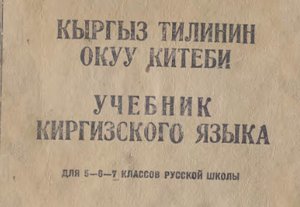President Sooronbai Jeenbekov called for an increased role for the Kyrgyz language in the republic, noting that employees should speak their native language at the level required by the Kyrgyztest system. The head of state demands to strengthen the influence of the Kyrgyz language as a key symbol of the state and the "attribute" of the nation, but promises that the Russian will retain its official status in Kyrgyzstan.
"The Russian language is a window to world culture, the world of science and knowledge," Jeenbekov said on September 23 at the celebration of the 30th anniversary of granting of Kyrgyz a status of the state language. "Over the past 30 years, the Kyrgyz language has undergone significant changes, it has grown and developed. We have to solve many problems in order to make it the language of interethnic communication. At the same time, I declare that the status of the Russian as official language will be maintained." Jeenbekov expressed dissatisfaction with the fact that only 40% of office work in the republic's state bodies is conducted in the Kyrgyz language, and the quality of documents prepared in it remains extremely low, which damages the authority of the state language.
Meanwhile, a number of experts claim that the Russian language is losing its position in the republic. Since Soviet times, all documentation has been conducted in two languages, however, in recent years, the authorities have been preparing a complete transition to the Kyrgyz one. Also, state institutions have introduced a compulsory exam on knowledge of the Kyrgyz language. A number of politicians and deputies periodically suggest depriving the Russian of official status in order to preserve and develop the Kyrgyz language, and introduce fines for not knowing it. In accordance with the Constitution of Kyrgyzstan, Kyrgyz is the state language, and Russian is official.
"On the contrary, there has been a trend in the loss of the Kyrgyz language in Kyrgyzstan. According to statistics from the Ministry of Education, over the past 16 years, the number of schools teaching in Russian has increased from 140 to 170. The number of children attending Russian schools has grown to 126.5 thousand. Therefore, the president's statement was just in time. But, unfortunately, there was nothing significant in his speech. The development of the mother tongue should be a key priority for any country," ex-presidential candidate, public figure Toktayim Umetaliyeva told Vestnik Kavkaza.
According to her, Jeenbekov’s statement was reminiscent of the recent statement by Kazakh President Kassym-Zhomart Tokayev, who, after winning the election, set the task of developing the Kazakh language. He then noted that language is a "tool of big politics" and called for "working together without unnecessary conversations" to increase its status. Tokaev also believes that Kazakh should replace Russian as the language of interethnic communication in the republic. Jeenbekov also proposed making Kyrgyz the language of interethnic communication. He urged citizens to use the Kyrgyz language more often. "Dissemination of information to the public, the holding of various public events, the clerical work in institutions should be carried out mainly in the state language," Jeenbekov said.

According to Umetalieva, the situation with studying the Kyrgyz language in the republic is difficult: "There are no textbooks, no manuals, no programs, no money for the development of the native language. And the existing textbooks are full of mistakes. Therefore, parents prefer sending their children to Russian schools. There was not and could not be fear of losing the Russian language. But the fact that we're losing the Kyrgyz language is obvious. I expected from Jeenbekov as the leader of the nation an attempt to educate young people who remember their history and culture. If we know Russian, English, Chinese but don’t know Kyrgyz, what kind of unity of the people are we talking about?" Toktayim Umetalieva proposed introducing total dictations in Kyrgyz, as it is done in Russia with Russian, and for senior students taking an oral and written examinations.
According to Umetalieva, the society periodically raises a discussion about transiting the Kyrgyz language from Cyrillic to Latin: "The Kirghiz already had 10 years of experience in using the Latin alphabet from 1929 to 1940. Prior to that, the Kirghiz used Arabic script. So the history of the Kyrgyz people was written in Arabic script. The works of great scholars of the East were published in Arabic. It would be logical to introduce the study of Arabic so that people can read the original works." Umetalieva considers proposals to transfer the Kyrgyz to a different alphabet as populist, since, on the one hand, this entails large financial costs, on the other hand, a huge literary, historical, scientific fund has been accumulated over 80 years of using the Cyrillic alphabet, and there's no sense in throwing such wealth away.






